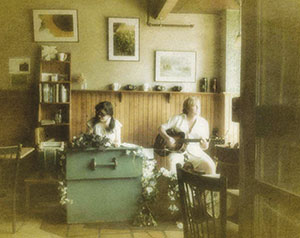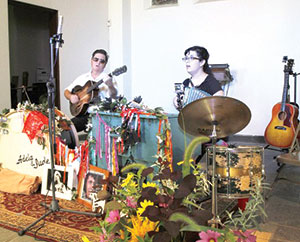
Singing for their suppers, Adela & Jude are on that dusty road less travelled.
By Blake Maddux
AnaMaria Broding and Matthew Moran are a musical duo that performs under a moniker that is made up of their middle names: Adela & Jude.
Many years prior to meeting, Moran attended the New England Conservatory, while Broding earned a full scholarship to study piano at Berklee College of Music. She later pursued graphic design.
Adela and Jude were each raised in families that were deeply rooted in farming and traditional Christian values. In the time that they have performed together, they have drawn on both of these in their determination to support local farmers and the needy.
In 2014, the couple will embark on their self-conceived, nationwide “Will Sing for Food” tour. While on the road, they will feed themselves with donations from attendees and use tips and money from merchandise sales to fuel the van in which they will sleep.
Jude Moran recently agreed to an interview with The Somerville Times to discuss the past, present, and future of Adela & Jude.
Somerville Times: How did the two of you meet?
Jude Moran: We met about 5 years ago, originally as a couple without performing. When we met outside of music, Adela was intrigued with an old Estey Pump organ that I had found years before. With a love of old Southern spiritual music, the band was born.
We have been performing as a duo for about the last four years. We’re both lifelong musicians with a really diverse background.
ST: Between the two of you, how many instruments do you use?
JM: Probably about a dozen. I play kick and snare [drums] with my feet while strumming six- and four-string guitars, banjos, mando[lin], and autoharp. Adela plays pump organ, toms, cymbals, comb, and hand percussion. We joke that we have as much as a full band for two people.
ST: How much touring have the two of you done?
JM: We tour a lot in the spring and summer months, usually six to 10 days at a time. We’ve been developing some solid routes from Boston to Tennessee, up to Chicago, and back to Massachusetts over the last four years. We started playing farmers’ markets as fill-in for afternoon shows and found that our music was a perfect fit.
This is when touring and playing club and gastropub venues began to shift to farmers’ markets and outreach shelters for the poor and hungry. Drawn to the local food movement, we began reaching out to markets and found an audience who was keenly attuned to the music and message.
 We travel in our van, living very bare bones on the road. When we played markets, the farmers and market managers would hand us huge bags of produce. When we’d count up our tips, we realized we could make more playing markets than most clubs loaded down with 4 or 5 acts for the night. Over 2011 and 2012, our shows became more and more focused on performing 3- to 4-hour sets at markets. Our visual stage set is full of iconic pieces picked up along our travels, each bringing a unique spirit to our stage.
We travel in our van, living very bare bones on the road. When we played markets, the farmers and market managers would hand us huge bags of produce. When we’d count up our tips, we realized we could make more playing markets than most clubs loaded down with 4 or 5 acts for the night. Over 2011 and 2012, our shows became more and more focused on performing 3- to 4-hour sets at markets. Our visual stage set is full of iconic pieces picked up along our travels, each bringing a unique spirit to our stage.
ST: Which venues have you played in Somerville?
JM: We’ve played a lot over the last few years: Johnny D’s, Sally O’Brien’s, Precinct, the late Rosebud. But we’ve been changing our direction gig–wise and playing more things like the Monday Project SOUP [Share Our United Pantry] at the First Congregational Church in Somerville. We hope to continue reaching to the community to bring more music to situations like this. We also have played the Somerville Farmers’ Market at the Armory for the last three years, and love it there.
ST: What is Will Sing for Food?
JM: It occurred to us that the people we met over the past couple years—the farmers, the market managers, the customers—all contribute to the thriving of their local economies. As traveling musicians, we are interlopers into every community that welcomes us in. We feel so lucky that we can experience this. The most vibrant towns that we encounter are the ones where community means everything.
Keeping the money local ends up keeping the economy healthy, and the community engagement is what makes a farmers’ market work. We’ve felt that a wonderful way to celebrate these communities is to document our travels, and make a commitment to feeding ourselves on the food we get donated by farmers. In this way, we can showcase the vibrancy of local farms and markets.
Food is such a powerful social medium that the result of these markets is the re-engagement of community. Adela and I come from families where farming was a big part of our heritage, and our musical style and social commitments naturally led us to performing at farmers’ markets.
ST: How extensive, in terms of time and geography, is the tour?
JM: 2014 will be a year of planning and production of the film and our tour starts in 2015, with the fall of that year to be our release. It will take us from the Northeast all the way to Florida and toward the Mississippi River, and following along the river north to Chicago. We are getting offers from farmers’ markets in Colorado and beyond. We’re still in the planning stages of the route, and more markets are signing on for us. We expect to be on the road full time from April until October.
It’s a big risk for us, professionally and personally, but we feel it’s the right thing to do.
ST: How will local farmers, businesses, and needy people benefit from Will Sing for Food?
JM: We want people to realize that farmers’ markets are not just a trendy fad. There are real serious issues with our food system in America. We must focus on local farms feeding local people through encouraging people to grow food themselves, on a micro scale, and helping others to learn how easy it is to grow basic vegetables.
Helping the poor, elderly, and needy is simply the right thing to do, especially when you look at, for example, the number of children in Somerville living in poverty. Schools need to have classes in farming for the children, a school farm. We’re hoping we can include this kind of action in our film and encourage the schools to move in this direction.












Reader Comments